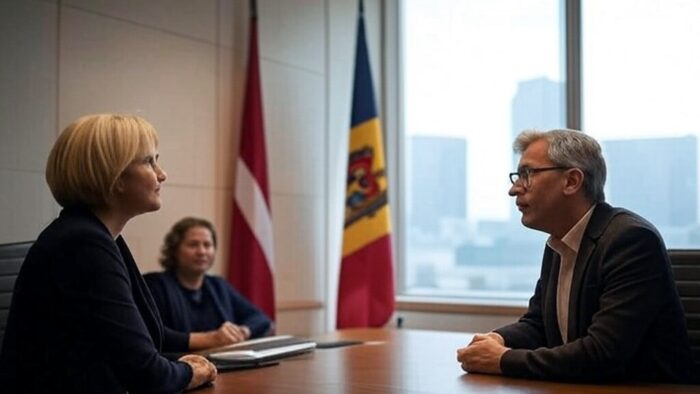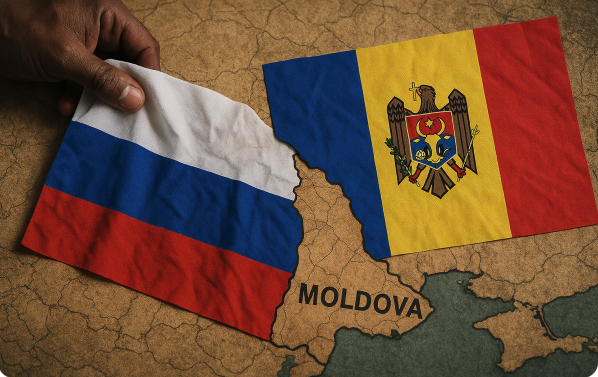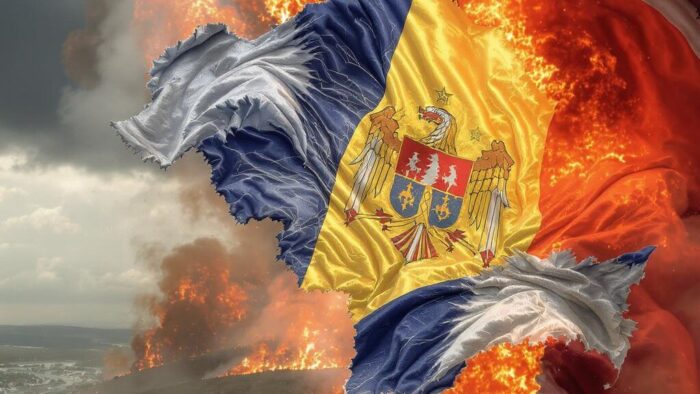Fake news operations in Moldova have been exposed in a new BBC investigation revealing Russian election interference efforts. On 22 September 2025, BBC reported that a secret Russian-funded network is attempting to disrupt Moldova’s upcoming democratic elections through propaganda and disinformation campaigns. The network promised to pay participants for posting pro-Russian content and fake news targeting Moldova’s pro-EU ruling party ahead of the September 28 parliamentary ballot. The article begins:
A secret Russian-funded network is attempting to disrupt upcoming democratic elections in an eastern European state, the BBC has found. Using an undercover reporter, we discovered the network promised to pay participants if they posted pro-Russian propaganda and fake news undermining Moldova’s pro-EU ruling party ahead of the country’s 28 September parliamentary ballot. Participants were paid to find supporters of Moldova’s pro-Russia opposition to secretly record — and also to carry out a so-called poll. This was done in the name of a non-existent organisation, making it illegal. The results of this selective sampling, an organiser from the network suggested, could lay the groundwork to question the outcome of the election. The results of the so-called poll, suggesting the ruling party will lose, have already been published online. In fact, official polls suggest the ruling Party of Action and Solidarity (PAS) founded by President Maia Sandu is currently ahead of the pro-Russian Patriotic Electoral Bloc (BEP).
Read more: https://www.bbc.com/news/articles/c4g5kl0n5d2o?at_medium=RSS&at_campaign=rss
Key Points
- BBC undercover investigation revealed Russian-funded network paying for anti-government disinformation in Moldova
- Network linked to sanctioned oligarch Ilan Shor and NGO Evrazia, both connected to Kremlin influence operations
- At least 90 TikTok accounts produced thousands of videos totaling over 23 million views since January
- Participants instructed to conduct illegal polling and secretly record pro-Russian opposition supporters
Russian Interference in Democratic Elections: How Moscow Targets Electoral Systems Across Eastern Europe and Beyond
Russia has systematically escalated its interference in democratic elections, evolving from traditional influence operations into sophisticated hybrid warfare campaigns that threaten the foundation of electoral integrity worldwide. Russian interests spent $182 million on US influence operations since 2016, with foreign agents working for Russian state media outlets spending $34.8 million on propaganda targeting America in 2021 alone, while Project Lakhta developed fictitious online personas that posed as US citizens to interfere in American elections.
The Kremlin’s tactics have become increasingly brazen across Eastern Europe, where recent elections revealed the full scope of Moscow’s electoral manipulation arsenal. Romanian intelligence uncovered a massive TikTok operation that elevated far-right candidate Călin Georgescu through $381,000 in undisclosed payments and 85,000 attempted electoral system hacks. Similarly, the European Parliament documented how Moldovan security services identified approximately €100 million in Russian spending to undermine electoral processes and get Moldovans to vote against EU ties, including a large-scale voter fraud scheme involving $15 million transferred to 130,000 Moldovans as bribery payments.
These coordinated attacks follow a consistent pattern designed to destabilize pro-European governance through multiple vectors simultaneously. Russian election interference tactics transformed Eastern European politics as Moldova faced these systematic vote-buying operations despite President Sandu’s narrow EU referendum victory, while Polish authorities documented over 50 incidents of Russian interference targeting their presidential elections. US Institute of Peace analysis confirms that Russia’s 2024 Moldovan interference included cyberattacks, planned espionage at diaspora polling stations, and direct vote purchasing, with opposition candidate Stoianoglo running a campaign funded by fugitive pro-Russian oligarch Ilan Shor and ultimately by the Kremlin.
The broader implications extend far beyond individual election outcomes, as the Atlantic Council’s analysis reveals that Russian election interference creates new technological and societal vulnerabilities that malicious actors exploit to damage public trust in democratic institutions, exploit societal tensions, and erode the foundation of the rules-based international system. This systematic campaign demonstrates how Russian-backed media outlets participated in spreading disinformation about US elections across European platforms, creating a transnational network designed to undermine democratic legitimacy wherever it emerges.
External References:
- Parliament condemns Russia’s interference in Moldova — European Parliament
- Russian Interference in the 2024 Moldovan Presidential Election and Constitutional Referendum — United States Institute of Peace
- Defining Russian election interference: An analysis of select 2014 to 2018 cyber enabled incidents — Atlantic Council
Disclaimer
The Global Influence Operations Report (GIOR) employs AI throughout the posting process, including generating summaries of news items, the introduction, key points, and often the “context” section. We recommend verifying all information before use. Additionally, images are AI-generated and intended solely for illustrative purposes. While they represent the events or individuals discussed, they should not be interpreted as real-world photography.











